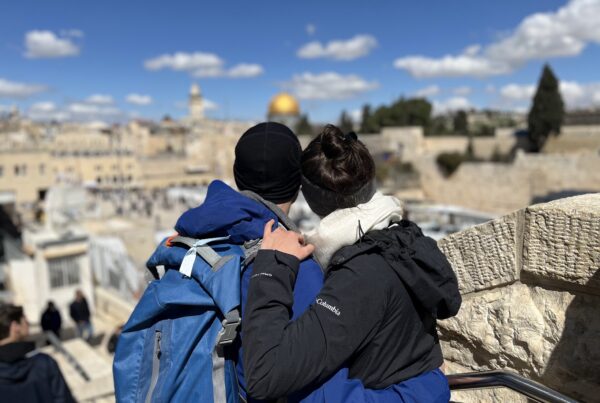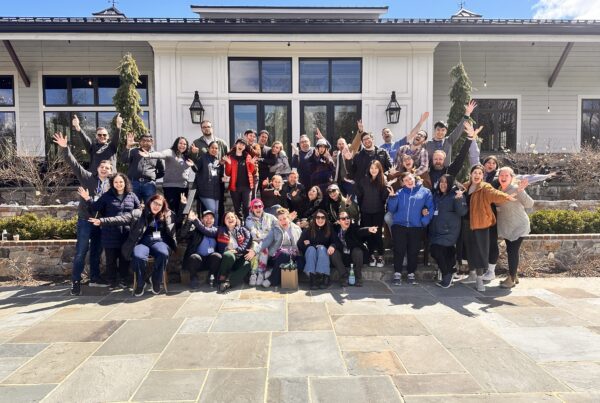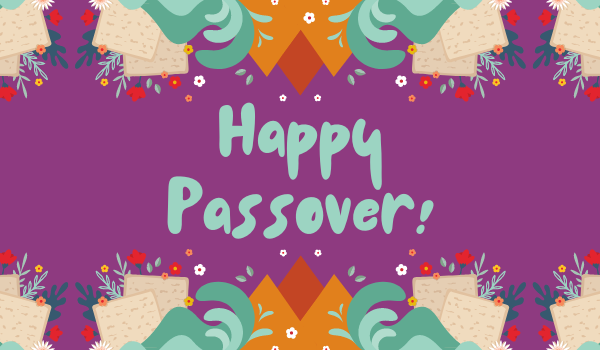“What is this symbol?” a 7-year-old Julia asked. “That’s the star of David. It means you’re Jewish,” she was told. This was the first time Julia had ever heard that she was Jewish.
Julia didn’t know she was Jewish until she and her family emigrated to the United States when she was a child. For many years, Julia had no Jewish identity because of the anti-semitism in her home country of Belarus. That all changed as she began to learn about her heritage, especially when she and her Catholic husband, Andrew, found Honeymoon Israel (HMI). Through Honeymoon Israel, she found what she needed but never knew that she did—an organization that would give them a way into the Jewish community. A sense of belonging. A connection to people.
Andrew grew up Catholic and attended Catholic school. He had a deep knowledge of his faith and what it meant to his family. When he married Julia, Andrew became interested in learning more about Judaism. Seeing her partner’s interest made Julia want to learn more, too. Being in an interfaith marriage brought Julia closer to her Jewish roots because they both wanted to grow together and learn how to connect their faiths. HMI gave them the opportunity to learn together, the tools to explore Judaism in their own way, and the community to support them on their journey.
“HMI means so much to me personally as the Jewish partner,” shared Julia. “I think for Soviet Jews, you carry guilt about what the Jewish people went through for modern-day Jews to not be involved. It felt shameful that I didn’t develop the Jewish part of my identity when other people died for their Jewish identity. I didn’t have that skill set. As a couple, it’s unreal to get to know each other more deeply and come together. Personally, to shed that guilt and be able to build a Jewish identity, I can’t even begin to explain how deep that goes.”
For Andrew, he also felt a new closeness to Jewish life, “I hadn’t met a Jewish person until college. I didn’t know beyond what I’d seen on TV what it meant to be Jewish. HMI gave me the opportunity to ask without fear what it means to be Jewish and has been a great resource for us.”
HMI has not only given Julia and Andrew a connection to Jewish life, but it’s also given them a group of people they can truly connect with and build lifelong bonds. “The sense we get from HMI is we’re here to support you Jewishly, but also support you as a person. I respect so much that the non-Jewish partner is never silenced and everyone is supported without trying to change them. After the trip to Israel, those people really are your friends and family. I really feel loved. Everyone is in the fold and everyone is looked after. We continue to be blown away, ” said Julia.
Early this year, Andrew and Julia became parents. Their HMI community in Chicago experienced a baby boom. They, along with nine other couples, brought their first child into the world. It was an exciting time as the ten couples welcomed new members to the family. Stephanie Goldfarb, HMI’s Chicago Director of Community Engagement, thought this was a perfect opportunity to bring everyone together and to learn about an important Jewish tradition, a baby naming ceremony.
Stephanie worked with Chicago’s Rabbi Jeff Stombaugh from Mishkan to plan a workshop that all HMI alumni were invited to during which they taught about the concepts and philosophies behind Jewish baby-naming practices. This was an important moment for Andrew and Julia, as in the past Julia felt like she’d be ok with her children not having a connection to their Jewish heritage. After the session, they chose to participate in the group baby naming.
In the midst of a pandemic, the HMI community came together to cherish and celebrate love, life, and each other. They had originally planned for the ceremony to take place at the Chicago JCC, but when the coronavirus hit, they pivoted to an online celebration. All ten couples with their babies participated. Their friends and family were all able to join, including more than 100 HMI alumni.
During the ceremony, each family introduced their baby and spoke their Hebrew name aloud, explaining where the name came from and why it was selected. They all shared their wishes and blessings for their children.
The inclusive ceremony made everyone feel welcome, as Andrew expressed, “The HMI group baby naming broke down walls. Before HMI, I didn’t know a baby naming existed. In the Catholic faith there’s the baptism that introduces the baby to the larger community. When I learned more about the baby naming and that you give the baby a Hebrew name, it felt special that we got to do that for our daughter. It was really meaningful to have that religious connection with her and introduce my family to this Jewish tradition. It was the first Jewish experience for my Catholic family and it was an awesome ceremony they never would’ve experienced in their life. They were blown away and loved it.”
It was also deeply meaningful for Julia, “It meant a lot to me. If HMI hadn’t organized this, we wouldn’t have done it. We needed someone to create meaning where there was none. HMI created this space in my life and in my child’s life. In one generation, from me not knowing I was Jewish in my childhood, to me now giving my daughter a Hebrew name, this organization has really made a difference in our lives. For all of the couples, this was really special.”
For these families who honor different faiths, it was an incredible opportunity to take part in an important Jewish ritual alongside their friends and family. If it wasn’t for this HMI ceremony, they wouldn’t have given Hebrew names to their babies.
###





